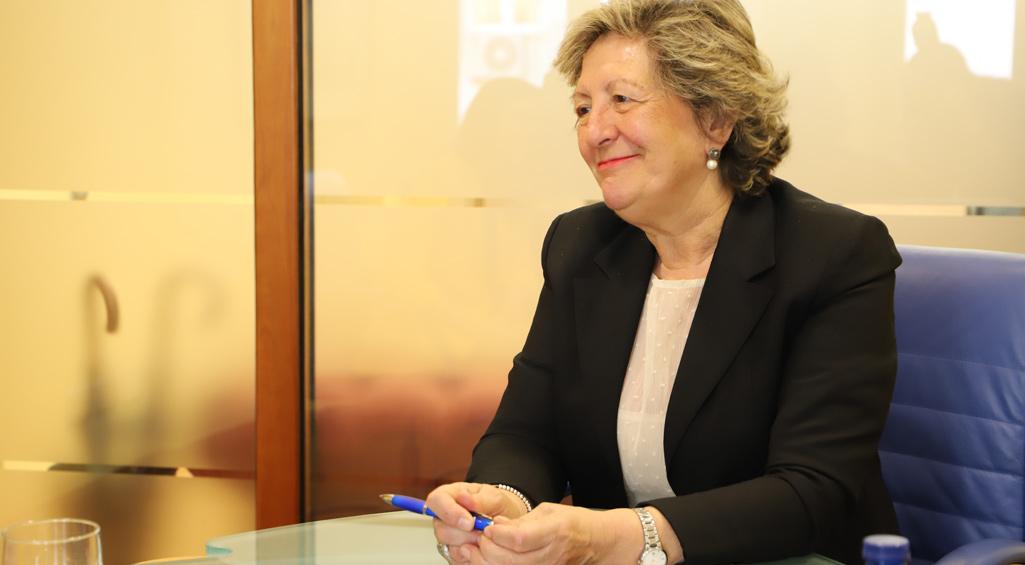
Pilar Gónzalez de Frutos, Chairwomen of UNESPA (The Spanish Union of Assurance and Reassurance Entities)
“We are the largest service platform in the country”
Pilar González de Frutos has been the chairwoman of UNESPA since 2003. Ratified in May, 2019, this is her fifth term at the head of the insurance sector’s employers’ association. From her executive position she has experienced a global financial crisis, a worldwide pandemic and the emergence of new technologies in a sector that has continued to grow, year after year.
What role does health insurance play overall?
At the close the first quarter, health insurance had reached a figure of 2,700 million euros and of course, it is the second business line that invoices most within the non-life insurance package. It is only exceeded by the motor vehicle branch - which is an obligatory insurance policy.
Have Covid-19 and longer waiting lists in public health increased the amount of policies?
Health insurance has had sustained increases for decades now, although the pandemic was an additional boost. Between 2019 and 2021 the number of people with private health insurance has risen by almost one million and currently there are around 11.6 million policy holders. I think that health insurance does not need public health to operate badly in order to be able to develop: the two systems both have a large amount of room for growth. It is true that the health insurance model, at the moment, is something that deserves approval by consumers. They are competitive, reasonably-priced products, the offer is very wide and varied and they have additional coverage that is not available in the public system.
The fundamental transformation that has occurred has been the changeover from an indemnity model to another one that uses service provision
Spain holds position number 15 amongst the European countries with greatest capillarity in health insurance. Should we carry on working on this?
In Spain the insurance density is reasonably in line with the level of development that it has in the entire area of protection insurance other than life insurance. We Spaniards protect our assets, the car, house or business in a way that is very similar to our European colleagues. Where there is a great difference is in the life insurance branch; there we are way behind the accumulation of savings for retirement that our French or German colleagues have. I think that this is because we have not deployed the necessary steps to promote this complementary social welfare as these other countries already have. Looking at this in a positive light, as I always like to do, it means that we still have important growth possibilities. Regarding health insurance, the Spanish case cannot be compared with other European countries, because the healthcare models are different in each country.
And insurance allows savings in public health.
Every time a policy holder uses their private policy, they are avoiding putting pressure on the public service and this is a very important saving in costs or, at least, an improvement in the care quality in the public system that can provide its services because it is under less pressure. Furthermore, I think that the care that the insurer sector has provided during the pandemic is a good example of how effectively the two systems can collaborate. It has attended all the patients with Covid-219; it has carried out millions of PCR tests for its clients and, of course, it has made a highly estimable contribution to the public health system.
What challenges is the sector facing?
Digitalisation is having an increasing impact on the way that we relate to clients and in being able to adapt the offer to their requirements. In the insurance field, which is basically a service provider, digitalisation will become more and more important. Sustainability is another fundamental part of business management and much more so in insurance companies because we are an industry that has a special interest in the long term. And regarding the demographic ageing, I think that here, clearly insurance can appear as an ally for the public powers to be able to attend to the needs of the future. On this point, I think that the construction of public-private alliances is essential to achieve greater efficiency in providing more and more frequent services, derived from the ageing of the population.
UNESPA has been working since 1977 to defend the sector’s interests. How has insurance evolved?
I think that the fundamental transformation that has occurred over the past 40 years has been the changeover from the indemnity model to another one that uses service provision. Previously, when a policy holder had a problem, the company assessed it, wrote out a cheque and the client had to take care of the rest. Now, we can call the company so that they sort everything out. It is a change that occurred decades ago, but which allows us to affirm that we are the largest service platform existing in our country. We provide service in areas as diverse as motor vehicles, the home, trade, industry, health or death. It is true that the needs have changed and that some things have probably evolved faster than others. There are even some that should have evolved and haven’t done so, for example, in the insurance sector we aspire to have an independent supervisor as occurs with the banking sector. We have been calling for this for many years, but as yet we have not achieved it. I should say that it is a tremendously dynamic sector in which, every time a new risk appears, it is analysed and progressively, this risk is covered. While there are risks in our lives, we will have the insurance sector there to cover them.
How is the entry of new technologies affecting the sector?
Coinciding with the end of the lockdown, we launched a study about how clients’ perception had changed regarding our activity. Consumers are asking us for greater implication in the reconstruction and greater transparency to generate trust. Policy-holders also want to protect their health in an accessible, comprehensive way and they want to have the possibility of designing their own products, which could be laid out in modules. In the case of saving, they want us to help them to overcome economic uncertainty and within the services area, they are increasingly looking for full cover for the entire family. Regarding the new technologies, they are valued very well, but the study indicated to us that users are more and more wary about passing their data on to third parties. And the last thing that they told us is that although digital communication can help them a great deal, they do not want to lose personal contact. They continue to place their trust in personal contact. For us, these are the most important lessons, because we can use these points to design our business plans.
Pilar González de Frutos
Pilar González de Frutos (Navares de Ayuso, Segovia, 1956) was ratified as Chairwomen of UNESPA for the fifth time in 2019. She is a Law Graduate from the Universidad Autónoma de Madrid (UAM) and a State insurance inspector on leave of absence. Over her professional career, she has been the Operations Manager of the Consorcio de Compensación de Seguros (1988-1997), General Insurance Manger (1997-2002) and since 2003, she has held the position of Chairwoman of UNESPA.


